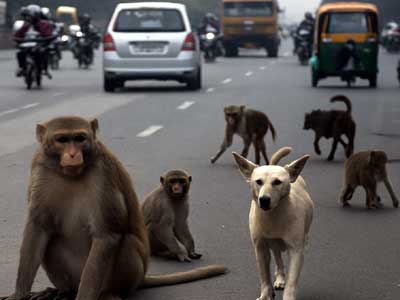When government sleeps, chaos thrives—this adage is playing out on India’s streets. Stray dogs, abandoned cows, and aggressive monkeys have turned our neighbourhoods and lanes into battlegrounds, while government agencies, lacking coordination, remain mere spectators.
India’s roads are not just echoing with vehicle horns but are also teeming with creatures ready to turn pedestrians and cyclists into victims. Drivers must stay alert at every turn—whether it’s a stray dog darting across, cattle roaming, or aggressive monkeys hanging from electric poles. This daily hazard is neither a divine curse nor a legacy of Indian culture—it is a direct result of administrative slumber and the ‘passing the buck’ mentality among responsible agencies.
On August 11, the Supreme Court, alarmed by rising rabies cases and over 35,000 dog bite incidents in the first half of the year, ordered all stray dogs in Delhi-NCR to be relocated to shelters within eight weeks. The decision sounds like a drop in the ocean. Delhi has 8–10 lakh stray dogs, and shifting them overnight is neither feasible nor practical—municipal corporations lack both infrastructure and funds.
India has over six crore stray dogs—37 per cent of the world’s total. Delhi alone records around 2,000 dog bite cases daily, with children and the elderly being the most vulnerable. Rabies claims thousands of lives annually, yet the Animal Birth Control program is as effective as ‘a pinch of salt in a camel’s mouth’—underfunded, sporadic sterilisation drives, and incomplete vaccination.
The roads of Uttar Pradesh, Rajasthan, and Madhya Pradesh have become ‘all-you-can-eat buffets’ for abandoned cows, leading to deadly accidents and endless traffic jams. While cow protection laws exist, the lack of rehabilitation schemes forces farmers to abandon unproductive cattle. The government assumed the problem would vanish, but it only worsened.
In Himachal Pradesh and Uttar Pradesh, monkey populations have exploded. People feed them in the name of worship or fun, but wildlife management has no concrete strategy. The result? Crop destruction, attacks on humans, and terrified tourists.
Public commentator Prof Paras Nath Chaudhary says, "Animals are innocent; the guilty are those who evade responsibility. Municipal bodies, animal husbandry departments, wildlife boards, and the police are all ‘singing different tunes’. Courts keep issuing orders, but without coordination, strict laws, and funding, these orders remain castles in the air."
Environmentalist Dr Devashish Bhattacharya says, "Countries like Turkey and Italy have shown that community participation and accountable local administration can humanely manage stray animals. In India, unless governments stop treating this as a ‘secondary issue’ and implement nationwide sterilisation, vaccination, rehabilitation programs, and strict penalties for animal abandonment, this terror will persist."
This is not just a public health or traffic crisis; it is administrative bankruptcy. Until the system is revitalised, our roads will remain battlefields, forcing people to navigate them at their own risk, says social activist Mukta.
The situation with abandoned cattle is no better. Roads have become grazing grounds for stray cows, causing fatal accidents and endless traffic snarls. These cows are often victims of political posturing—farmers abandon unproductive livestock due to weak rehabilitation policies under cow protection laws. Similarly, monkey populations have surged due to unchecked feeding and lack of wildlife management, leading to attacks on humans and crop destruction, adds Padmini Iyer, an animal lover.
Unless governments stop treating this as a non-issue and enforce nationwide sterilisation, vaccination, rehabilitation, and strict laws against animal abandonment, the terror of stray dogs, cows, and monkeys will keep turning our streets into dangerous battlegrounds. This is not just a public health or traffic safety crisis—it is an administrative crisis.
















Related Items
Modern Odyssey of Indian Agriculture...
2025: A Defining Year for Indian Growth…
RSS Chief is ‘Right’, Indian unity is not a 'British Gift’